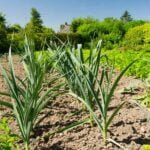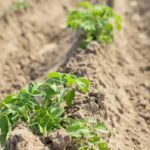Preparing A Vegetable Garden Soil
In order to have a successful vegetable garden, the soil must be properly prepared. Improperly prepared soil can lead to a number of problems, including poor plant growth, nutrient deficiencies, and insect and disease problems.
The first step in preparing your soil is to test it. Soil test kits are available at most garden centers. The test will tell you the pH of your soil and the levels of nitrogen, phosphorus, and potassium.
If your soil is not pH balanced, you will need to add lime to raise the pH or sulfur to lower the pH. Nitrogen, phosphorus, and potassium levels can be increased by adding organic matter such as compost, animal manure, or green manure.
Once you have determined the pH and nutrient levels of your soil, you can begin to prepare it. If your soil is heavy and clayey, you will need to add sand and organic matter to make it lighter and more fertile. If your soil is sandy, you will need to add organic matter to help retain water and nutrients.
Once your soil is prepared, you can start planting your vegetables.
How To Prepare Soil For Planting A Vegetable Garden
Soil preparation is one of the most important steps in planting a vegetable garden. The soil must be properly amended in order to provide the plants with the nutrients they need to grow. There are a few things you can do to prepare the soil for planting:
1. Test the soil pH. Vegetables prefer a pH range of 6.0 to 6.8. If the pH is too high or too low, you can amend the soil with lime or sulfur to adjust it.
2. Add organic matter. The best way to improve the fertility and structure of the soil is to add organic matter. You can do this by adding compost, manure, or other organic materials to the soil.
3. Till the soil. Till the soil to a depth of at least six inches. This will help to loosen the soil and break up any clumps.
4. Add fertilizer. A good vegetable garden fertilizer should contain nitrogen, phosphorus, and potassium. Apply the fertilizer according to the instructions on the package.
After you have prepared the soil, it is time to plant the vegetables. Follow the instructions on the seed packet to determine the correct spacing and depth for each vegetable. Be sure to water the plants regularly and to provide them with the nutrients they need to grow.
Miracle-Gro Vegetables & Herbs Moisture Control Garden Soil Fertilizer Enriched
with organic matter, this soil amendment helps retain moisture in the soil, giving your plants the best chance to thrive. The organic matter also helps improve soil structure and fertility, while the fertilizer provides essential nutrients to your plants.
Ideal for vegetables, fruits, herbs and flowers, Miracle-Gro Vegetables & Herbs Moisture Control Garden Soil Fertilizer is a great way to keep your plants healthy and looking their best.
Lowes Miracle Gro Garden Soil Vegetable
& Herb Mix is a specially blended garden soil that is enriched with Miracle-Gro plant food. The soil is pH-balanced, and it is specially formulated to help your plants grow big and strong. The soil is also enriched with organic matter, which helps to improve the soil’s overall structure and fertility. Miracle-Gro Garden Soil Vegetable & Herb Mix is also enriched with Mycorrhizae, a beneficial fungus that helps to improve the plant’s uptake of nutrients from the soil.
If you are looking for a soil that will help your vegetables and herbs grow big and strong, Miracle-Gro Garden Soil Vegetable & Herb Mix is the perfect choice. The soil is enriched with Miracle-Gro plant food, which helps to promote healthy plant growth. The soil is also enriched with organic matter, which helps to improve the soil’s overall structure and fertility. Miracle-Gro Garden Soil Vegetable & Herb Mix is also enriched with Mycorrhizae, a beneficial fungus that helps to improve the plant’s uptake of nutrients from the soil.
Do I Need Top Soil For A Vegetable Garden
?
The answer to this question is a resounding, “It depends.”
If you are starting a new garden, you will need to amend the soil with organic matter like top soil, compost, or manure. This will provide the nutrients your plants need to grow.
If you are growing vegetables in an existing garden, you may not need to add top soil. If the soil is healthy and has a good balance of nutrients, you can simply till in some compost to improve the fertility.
If you are not sure whether your soil is good enough, you can have it tested. A soil test will tell you the pH level, the amount of organic matter, and the nutrient levels of your soil. This information will help you decide whether you need to add top soil or other amendments.
So, do you need top soil for a vegetable garden? It depends on your soil conditions. If your soil is not fertile, you will need to add top soil or other organic matter to amend it. If your soil is fertile, you may only need to add compost to improve the fertility.

If you’re looking to get into vegetable gardening, or are just looking for some tips on how to make your current garden better, then you’ve come to the right place! My name is Ethel and I have been gardening for years. In this blog, I’m going to share with you some of my best tips on how to create a successful vegetable garden.





